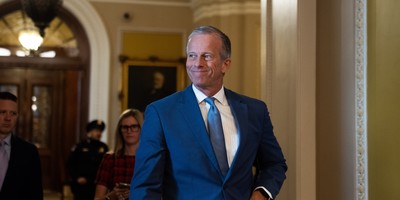California’s voters passed state law Proposition 22, in 2000, with 61 percent of the vote: "Only marriage between a man and a woman is valid or recognized.”
In 2008, the state Supreme Court overturned the law as discriminatory, so the voters spoke again. With 52 percent of the vote, Californians amended their state Constitution to ban same-sex marriage. This time, in 2009, the state’s high court upheld the constitutionality of Proposition 8.
Gay marriage advocates then went to federal court, and one U.S. District Court Judge, Vaughn Walker, a Reagan appointee, ruled that the ban on same-sex marriage violated federal guarantees of due process and equal protection, and unconstitutionally enshrined opposite-sex couples as “superior.”
Walker did not reveal that he was gay. His ruling was affirmed by the U.S. 9th Circuit in San Francisco, and the U.S. Supreme Court will now hear arguments and rule on Prop. 8.
31 states affirm only opposite-sex marriage, and 9 states plus the District of Columbia allow same-sex marriage. Almost universally, ancient laws against cohabitation or property sharing have been repealed for all couples.
The state debates on same-sex marriage have been thorough with legal scholars, religious leaders, and politicians all chiming in.
President Obama switched from opposition to endorsement of same-sex marriage, as did U.S. Senator Portman, (R-OH); after his son came out as gay (can one maintain long-held principle and loyalty to family?). Hillary Clinton produced a patronizing video for the Human Rights Campaign, and Meg Whitman, former candidate for Governor of California, publicized her new support for same-sex marriage.
Recommended
Many Americans have at least partial sympathy for the merits of both sides.
On the one hand, traditional marriage seeks to promote male-female relationships that produce and care for children, encourage an economic division of labor, maintain gender distinction, and focus men on commitment to family life.
Some advocates of same-sex marriage embrace the marital institution and wish to conserve family values. Others contend that freedom to marry for gays is mandated by notions of equality and fair treatment under the law, and that religious objections to gay sexuality should not result in legal discrimination against private love lives. One wonders if this theory will also argue for polygamy.
Civil unions and domestic partnerships that codify civic legal rights and contracts for gays have not satisfied the same-sex marriage movement, which has attracted increasing support among younger citizens, who have noticed the high divorce and out-of-wedlock birth rates in our nation. Traditional marriage has long been fraying.
An obvious compromise has failed: Marriage for opposite sex couples, and Gay Marriage (call it “Garriage?”), for same-sex couples.
While religious authorities often sanctify the marital union, the states have long regulated marital age, duties, rights and benefits.
But who shall decide the laws of each state?
In California, we the people voted twice, enduring campaigns funded by the Mormon Church and the Hollywood Crowd, and featuring some nasty hate speech from the “tolerant” left.
This is messy, direct democracy. Its majority rule and self-governance in a competitive laboratory of democracy, not control by 9 unelected judges from Washington, D.C.
President Thomas Jefferson warned that an unelected judiciary might lead to judicial supremacy:
"It is a very dangerous doctrine to consider the judges as the ultimate arbiters of all constitutional questions. It is one which would place us under the despotism of an oligarchy."
President Abraham Lincoln counseled in his First Inaugural Address:
"The candid citizen must confess that if the policy of the government, upon vital questions, affecting the whole people, is to be irrevocably fixed by decisions of the Supreme Court...the people will have ceased to be their own rulers, having, to that extent, practically resigned their government into the hands of that eminent tribunal."
Moral and political issues must not be removed from the democratic process, lest citizens lose the ability and interest to resolve complex issues and reach social consensus.
Making a federal case out of marriage again invokes an imperial judiciary, which has previously abused federalism by affirming slavery, imposing state taxes, federalizing criminal law, and nationalizing affirmative action, workplace rules, and abortion rights.
President Ronald Reagan agreed:
"The Founding Fathers were clear on this issue. For them, the question involved in judicial restraint was not -- as it is not -- will we have liberal courts or conservative courts? They knew that the courts, like the Constitution itself, must not be liberal or conservative. The question was and is, will we have government by the people?"

























Join the conversation as a VIP Member